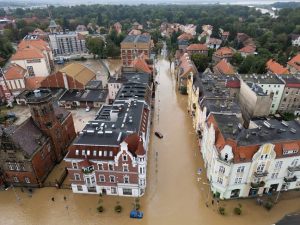Very heavy rainfall experienced in Central Europe in mid-September, which broke local and national rainfall records over the period of four days, was twice as likely due to human-induced climate change, according to a study by the World Weather Attribution (WWA).

Almost two million people in a large region in Central Europe including Poland, Czech Republic, Austria, Romania, Hungary, Germany and Slovakia were directly affected by flooding caused by extreme rainfall.
Analysis from WWA, which uses weather observations and climate models to understand how climate change influences the intensity and likelihood of extreme weather events such as extreme rainfall, heat waves and droughts, found that the rain was caused by a Vb depression, which forms when cold polar air flows from the north over the Alps, meeting very warm air in Southern Europe. Vb depressions are rare, but usually associated with heavy rain over Central Europe.
In today’s climate, which is 1.3°C above pre-industrial levels, a rainfall event of this magnitude is a very rare event expected to occur about once every 100 to 300 years, according to the WWA. Heavy four-day rainfall events have become about twice as likely and 20% more intense since the pre-industrial era at the regional-scale assessed.
The WWA’s assessment to quantify the role of human-induced climate change on this increase show roughly a doubling in likelihood and a 7% increase in intensity, although they note these are conservative results.
The findings also warn that in a scenario where the global temperature is 2°C higher than pre-industrial levels, four-day rainfall events will be even heavier, with a further expected increase of around 5% in rainfall intensity and a further 50% increase in likelihood compared to present day.
“Our study has found the fingerprints of climate change in the blasts of rainfall that flooded central Europe,” said Joyce Kimutai, a researcher at Imperial College London and one of the contributors to the report by World Weather Attribution. “Yet again, these floods highlight the devastating results of fossil fuel-driven warming.”
By Mercy Abutsa
